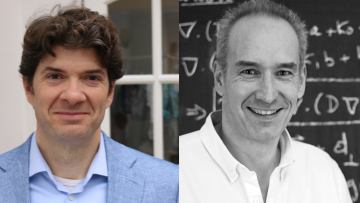Today Oxford Mathematicians Fernando Alday and Alain Goriely have been elected Fellows of the Royal Society (FRS) for their outstanding contributions to science.
Cyclic cohomology and generalized formal degrees for Affine Hecke algebras
Abstract
In this talk I will introduce affine Hecke algebras and discuss some of their representation theory, in particular their Fourier transform. We will consider discrete series representations and how their formal degrees can help us understand them. There is no quantity like the formal degree available to help us similarly study limits of discrete series representations. I will sketch how this difficulty might be overcome by using cyclic cohomology and its pairing with K-theory to introduce generalized formal degrees.
Arithmetic Topology and Duality Theorems
Abstract
I'll introduce the classical arithmetic topology dictionary of Mumford-Manin-Mazur-Morishita-etc. I'll then present an interesting instance of parallel phenomena related to symplectic structures on moduli spaces of certain bundles. The arithmetic side turns out to be an application of Poitou-Tate duality. Depending on time, I'll delve into the delicate details which make the analogy useful for Diophantine geometers.
Random matrices with integer entries
Abstract
Many classical arithmetic problems ranging from the elementary ones such as the density of square-free numbers to more difficult such as the density of primes, can be extended to integer matrices. Arithmetic problems over higher dimensions are typically much more difficult. Indeed, the Bateman-Horn conjecture predicting the density of numbers giving prime values of multivariate polynomials is very much open. In this talk I give an overview of the unfortunately brief history of integer random matrices.
Primes in arithmetic progression
Abstract
The distribution of primes in arithmetic progressions (AP) s a central question of analytic number theory. It is closely connected to the additive behaviour of primes (for example in the Goldbach problem) and application of sieves (for example in the Twin Prime problem). In this talk I will outline the basic results without going into technical details. The central questions I will consider are: What are the different tools used to study primes in AP? In what ranges of moduli are they useful? What error terms can be achieved? How do recent developments fit into the bigger picture?
An Overview of Geometric Class Field Theory
Abstract
In this talk, I would like to discuss Deligne’s version of Geometric Class Field theory, with special emphasis on the correspondence between rigidified 1-dimensional l-adic local systems on a curve and 1-dimensional l-adic local systems on Pic with certain compatibilities. We should like to give a sense of how this relates to the OG class field theory, and how Deligne demonstrates this correspondence via the geometry of the Abel-Jacobi Map. If time permits, we would also like to discuss the correspondence between continuous 1-dimensional l-adic representations of the etale fundamental group of a curve and local systems.


